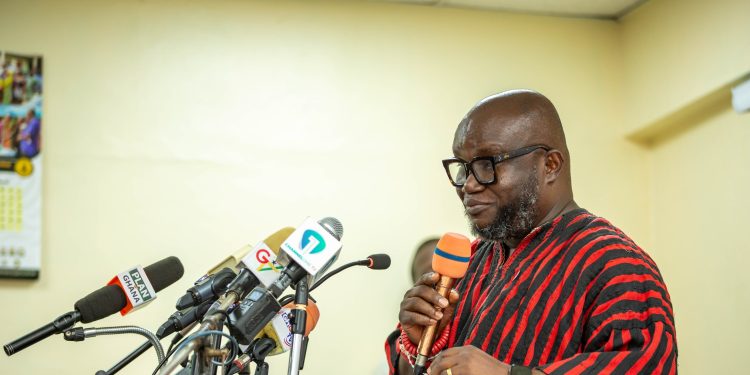In the wake of a high-profile meeting between President John Dramani Mahama and civil society organisations (CSOs) over the country’s escalating illegal mining crisis, Dr. Kenneth (Ken) Ashigbey, convener of the Coalition Against Galamsey (GCAG), told journalists that the session produced policy pledges but no clear timelines or milestones for delivery. The omission, he warned, leaves the public uncertain about when promised interventions will materialise.
The meeting, convened to hammer out a national response to the destructive practice known locally as “galamsey,” featured presentations by the Lands Minister and an exchange with the President. While the government outlined a range of measures, including the establishment of special courts to fast-track galamsey prosecutions and the prospect of declaring states of emergency in worst-affected areas, Dr. Ashigbey said the discussions stopped short of specifying triggering conditions or deadlines.
“Looking at what the Lands Minister did… in his concluding slide, there were a few issues that had timelines, but the majority of them did not have timelines,” Dr. Ashigbey explained, urging that clear markers of progress are essential to hold state actors accountable. He and other CSO leaders had intended to press the President on three specifics: what would trigger a state of emergency, the timelines for interventions, and the administration’s definition of success in the fight against illegal mining. Those questions, he said, remain unanswered.
Civil society groups have since stepped up pressure on the administration to act swiftly, arguing that intermittent announcements and public-relations campaigns are insufficient given the scale of environmental damage. Eco-Conscious Citizens, among other activists, pointed specifically to the unfulfilled promise of special courts, noting that talk of such courts has not been accompanied by firm dates for their establishment. “Yes, special courts are going to be set up, but we really haven’t got any timeline,” one campaigner said in public comments summarising CSO concerns.
The GCAG, through a signed document presented to the President, outlined its position and urged immediate, concrete action, including targeted states of emergency in the most ravaged mining zones. The coalition argues that a narrowly focused emergency response would disrupt criminal networks operating with impunity and protect communities and waterways from further devastation.
Beyond timelines, Dr. Ashigbey demanded accountability for alleged abuses and called for investigations where necessary. In media appearances following the meeting, he raised concerns about enforcement inconsistencies and selective prosecutions, and urged that seized equipment remain off the street until full legal processes conclude. This was in reference to recent court decisions that critics say undermine deterrence.
Government spokespeople have emphasised that the President’s engagement with CSOs was a step toward a coordinated national strategy. In his remarks at the meeting, the President reportedly outlined conditions that would precipitate a state of emergency but did not attach fixed dates to specific actions, a communication gap that critics say fuels scepticism. Proponents of the administration’s approach say that flexibility is needed for operational security and legal planning, while opponents counter that open-ended promises dampen public confidence and allow criminals to regroup.
Dr. Ashigbey and allied groups have proposed a short list of immediate steps, including the publication of a clear timeline for the promised special courts and fast-track prosecutions, a public schedule of areas to be considered for targeted states of emergency and the criteria for declaring them, an independent audit of recent enforcement actions and court rulings that appear to release seized machinery or fail to secure convictions, and periodic public briefings with measurable milestones so citizens can track progress.
Policy analysts and environmental campaigners warn that the clock is running out. One commentary noted that the “window to defeat galamsey is closing fast,” asserting that sustained, measurable action is needed to reverse damage to rivers, forests, and farming livelihoods. The debate underscores a broader tension in Ghanaian public life: balancing transparent, accountable governance against the operational discretion required for law enforcement.
CSOs say they will return to the public stage if timelines are not published within a specified, publicly stated period, a move intended to force clarity and drive follow-through. For now, the outcome of the President’s meeting is being judged not on rhetoric but on whether government agencies can convert commitments into time-bound actions and convictions that deter future crimes.
Read Also: FIDA Ghana Urges President to Declare State of Emergency on Galamsey

